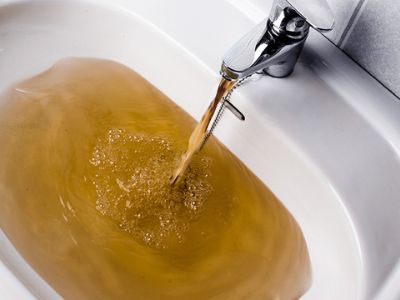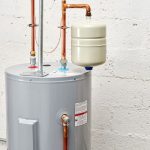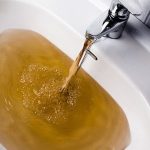
How To Know if a Water Heater Needs Professional Service
After a long day at work, there’s nothing better than a hot shower. However, when the home’s water doesn’t get hot, this can return a moment of relaxation into frustration. When a water heater doesn’t heat water, this is a good sign that it’s not working and needs service. Other underlying signs could also point to a defect or malfunction.
Here, homeowners can learn how to spot the signs of a faulty water heater and whether it warrants replacement. There is no need to suffer from a less-than-ideal water heater; homeowners have options.
A Water Heater Makes Loud Sounds
 A water heater shouldn’t make any noise. If a water heater makes a rumbling, hissing, or rattling noise, this could signify a problem, namely, sediment buildup. A water heater avoids sediments using an anode rod. Without getting too technical, this component draws sediment from the water and neutralizes it. However, if an anode rod is worn out, this could affect how it removes corrosive material from the water, leading to the corrosion of the water heater tank.
A water heater shouldn’t make any noise. If a water heater makes a rumbling, hissing, or rattling noise, this could signify a problem, namely, sediment buildup. A water heater avoids sediments using an anode rod. Without getting too technical, this component draws sediment from the water and neutralizes it. However, if an anode rod is worn out, this could affect how it removes corrosive material from the water, leading to the corrosion of the water heater tank.
Another reason for sediment buildup is when a water heater tank hasn’t been flushed in a long time. If the water heater maintenance is neglected in this way, this also leads to the corrosion of the tank. When the tank gets too corroded, it will need a premature replacement.
If one hears loud noises coming from their water heater, they should call a professional. An expert may recommend flushing the tank, installing a new anode rod, or a full replacement if the damage is too far gone. That is why professionals should be called immediately before damage can worsen.
Discolored or Foul-Smelling Water Comes Out of Faucets
 Everyone expects clear, clean water from their showerheads, appliances, and faucets. When one finds that discolored or unpleasant-smelling water comes out instead, this is a sign of a failing water heater due to corrosion or rust.
Everyone expects clear, clean water from their showerheads, appliances, and faucets. When one finds that discolored or unpleasant-smelling water comes out instead, this is a sign of a failing water heater due to corrosion or rust.
When a water heater’s tank, pipes, or other components rust, this can compromise the water’s integrity. The rust and corrosion that cause discolored water also happen because of sediment buildup in a water tank after neglecting maintenance. Here, a plumber may replace the anode rod and flush the tank, but if the damage is bad enough to change the water's color or smell, it will likely need a replacement.
Also, according to the U.S. Department of Energy, the average water heater lasts anywhere from 10 to 15 years. Once a water heater reaches the 10-year mark, a plumber may recommend replacement rather than pouring hundreds of dollars into a failing one.
The Water Heater Chronically Leaks
Some pipe leaks are easy fixes. A plumber assesses a problem, seals the leak, and is done. However, some pipe leaks, especially those that happen repeatedly, may warrant intensive repairs.
If a plumber finds that a water heater’s pipes constantly leak, burst, or corrode, they may recommend getting a new system. Sediment buildup, age, and excessive use may make getting a new system more economical than getting ongoing repairs. A plumber may replace an old water heater with a tankless water heater. These heaters can last more than 20 years and don’t run into the problems that older models do, such as chronic leaks.
About JD Precision Plumbing Services
JD Precision Plumbing Services has over a decade of experience serving the residents of Conroe, TX, and the surrounding areas. They provide upfront pricing, hassle-free service, financing, and strong communication. Call them today for water heater services in Conroe, TX.
Distribution Links +
- lifestyle.1045thedan.com
- htv10.tv
- lifestyle.mykmlk.com
- michigan.yournewsnet.com
- midwest.yournewsnet.com
- central.newschannelnebraska.com
- metro.newschannelnebraska.com
- midplains.newschannelnebraska.com
- northeast.newschannelnebraska.com
- plattevalley.newschannelnebraska.com
- panhandle.newschannelnebraska.com
- rivercountry.newschannelnebraska.com
- southeast.newschannelnebraska.com
- yournewsnet.com
- northeast.yournewsnet.com
- rfdtv.com
- snntv.com
- southeast.yournewsnet.com
- lifestyle.southernsportstoday.com
- southwest.yournewsnet.com
- lifestyle.thepodcastpark.com
- lifestyle.680thefan.com
- lifestyle.earl983.com
- west.yournewsnet.com
- lifestyle.xtra1063.com
- lifestyle.953hlf.com
- wicz.com
- lifestyle.rewind1019.com
- lifestyle.us983.com
- lifestyle.countrylegends1059.com
- wpgxfox28.com
- lifestyle.maverick1023.com
- lifestyle.967wshv.com
- wtnzfox43.com
- lifestyle.magic979wtrg.com
- lifestyle.1077lakefm.com
- lifestyle.3wzfm.com




